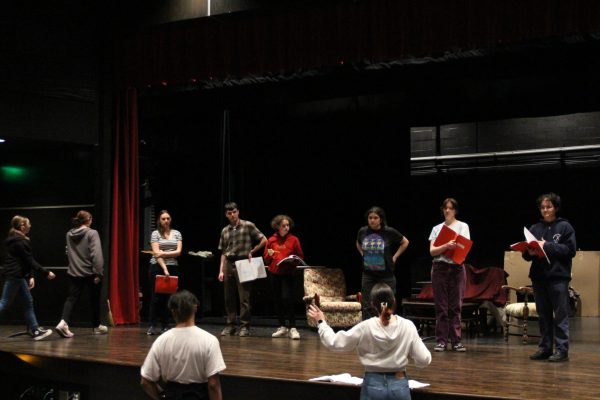Parental Leave at Mount Greylock and in the US
Currently, 193 countries belong to the United Nations, and over 150 of them mandate paid parental leave. The United States government does not. The current policy under the US Department of Labor is 12 weeks of unpaid, job-protected leave per year. According to a study done by the Organization for Economic Cooperation and Development, Canada mandates 16 weeks of paid maternity leave, Spain mandates 16 weeks of paid paternity leave, and in the United Kingdom, citizens receive two weeks of paid paternity leave or a resounding 39 weeks of paid maternity leave.
Although one of the richest countries in the world, the United States falls far behind in parental support. However, this doesn’t mean that smaller communities haven’t supported new parents.
“For me personally, I felt well supported,” Mount Greylock math teacher Crystal Williams said about the support from the MGRS administration. “I know that in the beginning, even before the leave, just trying to figure out all of that paperwork, I felt the district office was very helpful.”
Despite the support, none of the leave that any Greylock teachers receive is paid. “Essentially our jobs are protected for 12 weeks, but it is not paid leave,” social studies teacher Andrew Agostini, who is currently on paternal leave, wrote in an email. “In order to receive any money, we needed to use our sick time.”
Agostini is currently on the second portion of his paternity leave. He took four weeks off immediately after his son, Chip, was born in October, and is currently off for eight weeks from early February to March 30th. Williams has gone on two maternity leaves for two different children; she took her first in September of 2018 for 14 weeks. Her more recent leave started right at the beginning of this school year for 12 weeks. She returned to school in December of this school year.
Williams said that a lot of decisions regarding leave are usually based on access to childcare and job policies. “We were lucky that [my husband] worked from home and he was granted some leave,” Williams said. “So we ended up shifting our schedules around to make it so that he stayed home with the baby during the days.”
Agostini had a similar sentiment in terms of his family’s luck with parental leave. “We were fortunate to be able to take the first month together to bond as a family. Splitting the remaining time made the most sense in regards to childcare…Being able to extend our time at home with Chip, without having to look/pay for someone to care for him, was a priority.”
In 2018, a Ball State University sociology professor, Dr. Richard Petts, released research and data about paternity leave in the US and found that fewer than 5 percent of fathers take two or more weeks of paternity leave. “I’m appreciative of the time we got off. Both my wife and I were able to get 12 weeks off. From what I understand, that is relatively new, as I have friends and colleagues who in the past were given significantly less time for paternity leave,” Agostini wrote.
Paid parental leave remains a controversial topic in America, especially in the midst of war spending and government debt. “It’s disappointing to see how the United States values parental leave,” Agostini wrote. “We’ve given over $25 billion dollars in military assistance to Ukraine, and spent over $5 trillion in Iraq and Afghanistan. Surely there must be some spare change in the couch for parental leave.”
Even though the absence of paid parental leave is a tough reality for many parents, both Agostini and Williams were thankful for the teachers who stepped in during their absences and helped the transitions go smoothly. Former social studies teacher Shannon Dupee is currently subbing in Agostini’s class. While Williams was on maternity leave at the beginning of this year, the math teachers each picked up a few of the classes that Williams is now teaching.
“I love my job, so leaving school is tough; I feel totally out of the loop. I have great respect for the 9th graders and their ability to adapt and deal with the situation,” Agostini said.
“It’s always a hard thing to let someone else take control of your classroom,” Williams said. “I knew that my fellow department members would be checking in, making sure everything was good.”
Both Agostini and Williams talked about the difficult experiences of returning to school after parental leave as well.
“It’s always hard to go back to work in the sense that you go from seeing your baby all day every day to seeing your baby for a few hours every day,” Williams said.
“When I first came back in November, it was an emotional day,” Agostini wrote. “Little Chip was less than a month old, my wife was going to be alone with him all day, and I was trying to sort through what had been happening in class. It was really the students that made the transition back a lot easier. Whether it was wanting to see pictures, ask questions, talk sports, etc., it felt like we didn’t miss a beat. Shoutout 9th grade!”
At the end of the day, parental leave is all about watching your child grow and supporting your spouse in the life-changing process of raising a child together.
“The positives for that time period are really seeing the baby grow and being there with the baby,” Williams said.
“It’s just amazing hanging with [Chip] and seeing him grow and change. He can almost sit up and he’s getting ready to crawl. He’s so cute, smiley, and happy. I’m never going to get time like this with Chip again so we are trying to make the most of it,” Agostini said. “It will be tough going back, but I am excited to see my students.”

Molly is a senior who has been on the Echo for four years. She plays soccer and basketball and enjoys writing long features for the Echo. In her free time, she can be found reading any interesting book, binging Parks and Rec, or watching the same 4 movies on repeat - Pitch Perfect, Cool Runnings, Good Will Hunting, and Reputation Stadium Tour.




